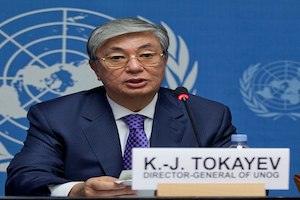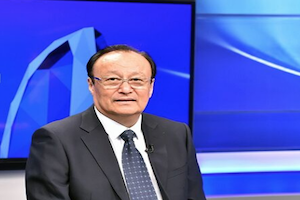Kazakh Anti-Chinese Protests and the Issue of Xinjiang Detention Camps
By Elzbieta Pron and Emilie Szwajnoch
October 31, 2019, the CACI Analyst
On September 21, another wave of popular anti-Chinese protests burst in Kazakhstan’s two main cities – Nur-Sultan (formerly Astana) and Almaty. During the demonstrations, Uyghur protesters joined Kazakh activists and jointly voiced their demands regarding Kazakhstan relationship with China. However, the issue of Kazakhs and Uyghurs detained in Xinjiang camps has been sidelined as a broader agenda has taken charge and the protests been overtaken by emotional anti-Chinese sentiments. While the official Kazakh response to the problem of Xinjiang camps has been very limited, yet the most active among Central Asian states, the collective voice of protesters is hardly going to have any effect on politics.

Xinjiang: Internment Camps with "Temporary" Characteristics?
By Ruth Ingram
March 25, 2019, the CACI Analyst
Official reassurances that Xinjiang's internment camps are only "temporary" fly in the face of mounting evidence to the contrary. Faced with incontrovertible data that now up to 1.5 million Uyghurs and Kazakhs are extra-judicially interned, Beijing is refusing to bow to international criticism and continues to justify its counter-terrorism strategy. Calling on the world to support its methods, Beijing is mounting an all-out public relations drive to persuade critical voices that in fact the camps are benign and successful in achieving their objectives. But the "experiment" already two years in operation shows no sign of abating. World leaders are calling it a cultural genocide and stepping up their demands to inspect the facilities.

New signs of Chinese military interest in Central Asia
By Stephen Blank
January 16th, 2017, The CACI Analyst
Recent evidence shows a gradual increase in Chinese military activity in Central Asia, particularly with Tajikistan, Afghanistan, and Pakistan, although China has for years denied any military interest in the region. In October, PLA and Tajik forces jointly participated in counterterrorism exercises in Tajikistan near the border with Afghanistan, following earlier activity in 2016. Whereas Tajikistan was then silent, this time it publicized the exercises, which aroused a visible anxiety in the Russian media although the Russian government has hitherto been unwilling to comment on this issue. China’s initiative could imply a major new development in Chinese policy and in Central Asia’s overall security, with lasting implications for the region.



